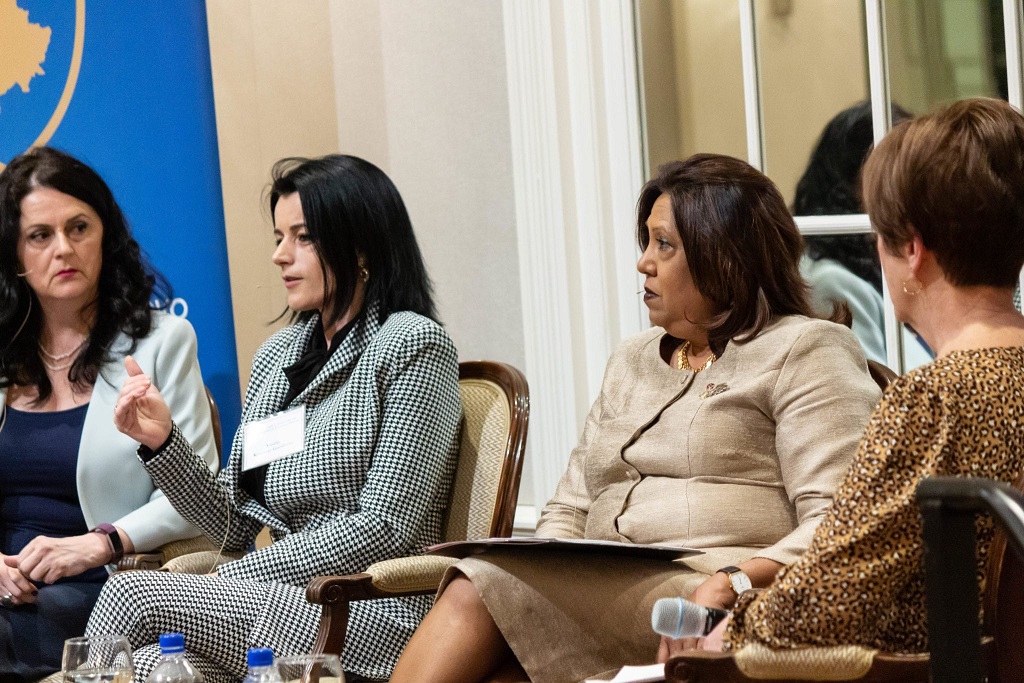Combatting sexual violence in conflict areas demands a collective effort by governments, non-government actors and grass roots movement to address the issue and support survivors’ search for justice. Policymakers need to pay attention to it. Because survivors like Vasfije Krasniqi-Goodman vow to be silent no more.
The National Committee on American Foreign Policy in partnership with Kosovo Consulate General in New York hosted a discussion about Perspectives on Combating Sexual Violence in Conflict. The abstract of the January 28th event stated in part: “Sexual violence in areas of conflict continues to loom as a shadow over international security. All too often present, and shamefully overlooked on the battlegrounds of the world, sexual violence demands the attention of global policymakers.” Moderated by Susan Elliot, President and CEO of National Committee on American Foreign Policy, the discussion featured Ms. Vasfije Krasniqi-Goodman, survivor, Her Excellency Ms. Pramila Patten, UN Special Representative of Combating Sexual Violence in Conflict, Ambassador Teuta Sahatqija, Consul General of the Republic of Kosovo, New York.
Ms. Goodman, who is a vocal advocate of survivors’ rights around the globe, is also a co-founder of “Justice for All” an NGO that helps Kosovo victims seek justice. In 2018, Ms. Goodman, a US citizen, went public with her story in Kosovo and a year later she testified at the US Congressional Hearing against war crimes committed by Serb forces against Albanians during the war. Through Kosovo, Ms. Vasfije has joined a Global Movement to end sexual violence in conflict. In her remarks, Ms. Goodman noted that in the course of her work she has met with survivors around the globe and their ages vary widely from very young girls to old ladies. “It underscored the inherited inactivity by state lawmakers and international organizations that had been going on for generations,” said Ms. Goodman. She admitted that when it comes to standing up against acts of sexual violence in war, speaking out is only the first step to holding the perpetrators accountable. “I speak for people to listen,” said Ms. Krasniqi-Goodman.
Mrs. Pramila Patten, the UN Special Representative on Sexual Violence in Conflict, has previously served as a member of the Committee on the Elimination of all Forms of Discrimination against Women. Mrs. Patten described the complicated process of working with non-state actors in post-war countries like South Sudan where the procedure requires first to report the names to the Sanction Committee of the Security Council and then follow an action plan that involves participation and “constructive engagement” of state and non-state actors. In Mrs. Patten’s presentation, such an experience is more often than not an exercise in frustration.
Ambassador Teuta Sahatqija, who was appointed Chief of the Consulate General of the Republic of Kosovo in New York in summer 2016, has been a political and women activist. She has worked directly with survivors of sexual violence during the conflict to support their cause. In addressing the devastation brought by the sexual crimes committed against the population during conflict, Ambassador Sahatqija said that as a premeditated act, rape becomes a weapon that aims to disintegrate the family and the fabric of society itself. Particularly, in the case of the Kosovo war of 1998-1999, an estimated of 20,000 women and men were sexually abused by Serbian military and paramilitary forces. Twenty years later, there has not been a single conviction of a war rape case in Kosovo. “The same goes to Serbia which didn’t prosecute or convict any war criminal for sexual crimes, despite having complete documentation of these cases gathered from UNMIK and EULEX, delivered to Serbia’s judiciary.” Ambassador Sahatqija spoke of actions taken to reintegrate survivors through economic empowerment and legislation. In Kosovo, art has been an important platform for breaking the silence such as the installation titled “Thinking of You” by artist Alketa Xhafa produced by Anna di Lellio dedicated to rape victims of Kosovo war and the Memorial “The Heroines” placed in the center of the capital, depicting a woman’s face made of 20,000 medallions that represent the victims of the sex crimes. In 2014, Kosovo’s President established the National Council for the survivors of Sexual Violence. In 2017, Government established the verification commission and allocated a budget for pensions. The Chief of Kosovo’s Consulate General added that economic independence will empower the victims and allow them to seek justice.
Moderator Susan Elliot thanked the speakers and allowed time for a few questions from the attendees. Anna di Lellio, International Relations Professor at NYU and New School, asked Mrs. Patten in reference to the UN Report on Sexual Violence which recognizes Bosnia but not Kosovo. More questions along the same lines came from activists like Lumi Hadri who expressed outrage at the UN for not including Kosovo in its Sexual Violence Action Report. Belul Gashi, businessman, asked if Ms. Goodman would be allowed to address UN. Intent on giving the issue a priority, Gaz Gjonbalaj, asked “How does action look like?” Present was Vatra’s Honorary President Mr. Agim Rexhaj and his wife, Laura. Attending the presentation were a number of representatives from UN Permanent Missions, members of International Peace Institute, several officials from Women’s Organization “Hope and Peace”, consultants from firms, UN Women for Peace Association and more. Mr. Agim Rexhaj, who is a member of the National Committee on American Foreign Policy since 2004, greeted Ms. Krasniqi-Goodman and Ambassador Sahatqija.
The discussion called attention to the issue that is posing a menace in many war-torn countries. A collective effort by governments, non-governmental actors and grass roots movement is needed to support change in addressing sexual violence in conflict areas.
January 2020

Komentet